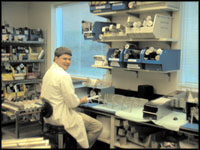information &
referral
case study
|
case study |
Fred Hutchinson Cancer Research Center Vocational Exploration Program Increasing the Hiring of People with Disabilities  The Fred Hutchinson Cancer Research Center is primarily housed in Seattle's Lake Union area with satellite offices in downtown Seattle. It is a mile from University of Washington and two miles from other medical centers in the Seattle area with whom the cancer research center collaborates. The center is directed by Nobel Prize winner, Dr. Lee Hartwell, and has more than 2,500 personnel with four divisions: Basic Sciences, Clinical Research, Human Biology, and Public Health Sciences. Examples of research highlights in the battle against cancer and other diseases for the 2002 year include genetic research on fruit fly development that has shed light on cancer's development (Basic Sciences), the development of allogeneic immunotherapy in treating multiple myeloma (Clinical Research), the effectiveness of breast self exam instructional programs (Public Health Sciences), and isolating gene location in inherited pancreatic cancer (Human Biology). Innovative Hiring Activity * The CBAs started in the glassware
facility where the Project With Industry (PWI) clients were taught
glassware retrieval procedures from approximately 80 laboratories,
procedures for sanitizing glassware according to lab requirements,
diverse recycling procedures for different containers, and measuring
procedures when using sanitizing chemicals. Over the years, this site
has become one of the routine competitive tryout stations for the
Project With Industry, with people who receive CBAs often transitioning
to permanent employment. The first of the series of transitions to
permanent hires involved an individual with a severe traumatic brain
injury and multiple days in a coma, and another individual with epilepsy
and significant developmental disabilities. Through Mr. Digel, inroads have been made
into other departments to include Biologics, which develops monoclonal
antibodies, and the animal facility that feeds and maintains rodents and
other animals involved in research activity. Other CBAs have also been
developed in purchasing (client with severe TBI), the legal department
(client with a law degree having developed MS), and other departments.
Use of the Department of Labor waiver has enabled Mr. Digel to counter
skepticism and influence other department supervisors to give those with
disabilities an opportunity to demonstrate their competencies. Mr. Digel
has also influenced Human Resources in identifying CBAs throughout the
cancer research center campus. Representatives from the Interpreter
Network have taught Human Resource personnel not only sign language
basics, but presented classes on the deaf community and culture that has
been very helpful, according to Ms. Williams, Employment Training
Manager. Much of the communication with these hearing impaired employees
is through e-mail when a co-workerís sign language is inadequate to the
nuances of a data entry project and other work activities. Interpreters
from the American Sign Language Network are made available to these
employees for trainings and monthly staff meetings. These research units
offer ideal opportunities within a prestigious research institution for
members of the deaf community, as do the center's infrastructure/support
units for those with severe neurological impairments.
For information regarding this Case Study
contact: * Personnel Interviewed: Mr. John Digel, Manager of Glassware Facilities; Ms. Clare Chapdu, Data Manager, Statistical Center for HIV/AIDS Research and Prevention; Ms. Kim Williams, Employment and Training Manager, Department of Human Resources
|
